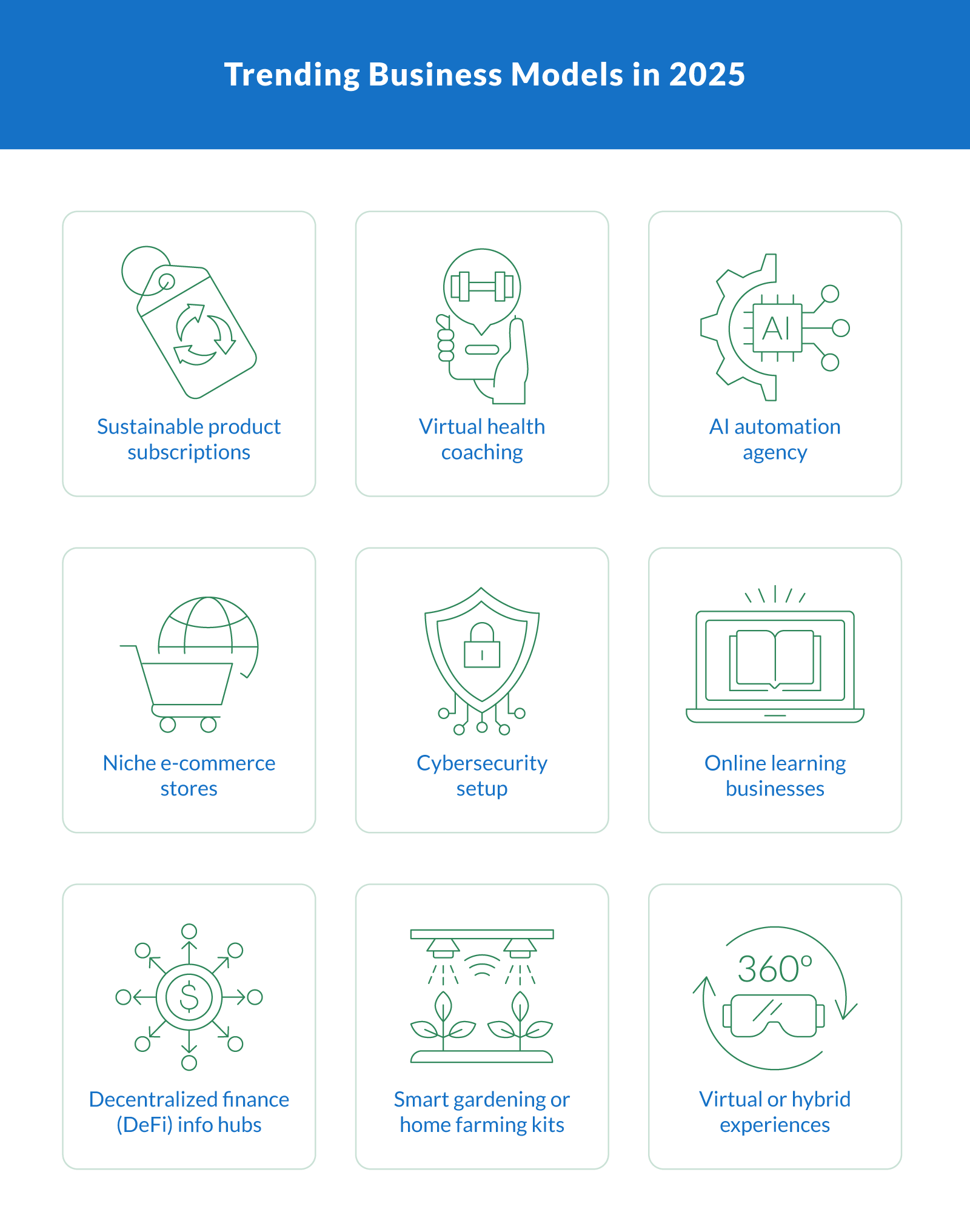Most entrepreneurs don't have tens of thousands of dollars to pour into a new venture. But the good news is: you don't need it. From digital services to product-based businesses, there are plenty of ways to start small and grow smart. In this guide, we'll highlight 25 of the most practical, profitable businesses to start with little money, plus tools, examples, and startup tips to help you make it happen.
Can You Start a Business With No Money?
Yes, and it's more common than ever. Thanks to digital platforms, automation tools, and a global marketplace, starting a business today doesn't require a massive investment. While the average cost to open a brick-and-mortar small business hovers around $40,000 per year, many online businesses can be launched for under $1,000 for online services.
If you're an entrepreneur with more hustle than capital, this guide is for you. We'll cover profitable business ideas, smart startup strategies, and modern business models that align with low-cost entrepreneurship in 2025. From social media gigs to print-on-demand stores, these opportunities prove you can build a legitimate small business on a shoestring budget.
Whether you're testing a side hustle or launching a full-time venture, these startup-friendly business ideas are designed for minimal upfront costs and maximum growth potential. Let's dive in.
No-Cost Business Ideas ($0 to $100)
Not every small business idea needs upfront investment. In fact, many service-based businesses can be started with little more than a laptop, an internet connection, and a smart marketing strategy. Below are three high-demand ideas you can launch with almost no startup costs, perfect for entrepreneurs looking to test the waters or grow a profitable business from the ground up.
AI Content Editing and Fact-Checking
With the rise of AI-generated content, there's a growing demand for skilled editors who can polish, verify, and improve that content for accuracy and readability. As a content editor, you can offer services like proofreading blog posts, verifying facts, rewriting for SEO, and ensuring high-quality standards across digital content. Businesses, bloggers, and marketing agencies are ideal clients. Market your services through LinkedIn, freelancer platforms, and word-of-mouth. Highlight your ability to help businesses stand out with clean, accurate, optimized content.
Social Media Management for Local Businesses
Most local businesses know they need to be on social media, but they don't have the time or know-how to manage their accounts effectively. That's where you come in. Offer social media management packages that include creating posts, engaging with followers, and building brand awareness across platforms like Instagram, Facebook, and TikTok. Focus on service businesses, like salons, realtors, and personal trainers, that benefit most from a strong online presence. Use referrals and word-of-mouth to build trust, and offer monthly reports to show the impact of your marketing strategies.
Video Editing for TikTok and YouTube Creators
Content creators and influencers are constantly looking for editors to help streamline their workflow. If you know your way around tools like CapCut, Adobe Premiere Pro, or Final Cut, you can offer video editing services that turn raw footage into engaging, polished content. Promote your side hustle on Upwork or Reddit forums, and include sample clips to show off your style. Pricing varies based on length and complexity, but even basic TikTok edits can fetch $25–$100+ per video, making this a strong option for building your own business with minimal overhead.
Business Ideas Under $500

If you've got a few hundred dollars to invest, your options expand significantly, especially for digital and e-commerce models. With the right business idea, marketing strategy, and a strong internet connection, you can launch a small business that scales with demand. These under-$500 opportunities combine low startup costs with high potential for recurring revenue and online growth.
Online T-Shirt Store (Print-on-Demand)
You can launch your own e-commerce brand without ever touching inventory. Dropshipping businesses can use services like Printful or Printify, which are integrated with Shopify or Etsy. Your online store automatically fulfills and ships orders as they're placed. Focus on a niche, like gym humor, local pride, or motivational quotes, and build a social media presence to promote your designs. Use digital marketing strategies such as TikTok videos or Instagram ads to drive traffic, and keep your overheads low by designing your own graphics or using ready-made templates.
Travel Blogging or Vlogging
Starting a blog or podcast focused on travel can turn your adventures into a profitable business. With minimal equipment (a smartphone and a basic mic), you can create content that attracts affiliate marketing deals, podcast sponsorships, and even paid partnerships with travel brands. Build your personal brand on social platforms, and use SEO tactics to grow your audience organically. Over time, this side hustle can evolve into a passive income stream with monetized content, digital downloads, or branded merchandise.
Curated Newsletters or Niche Substacks
Niche newsletters are making a comeback as busy professionals look for curated content tailored to their interests. Platforms like Substack let you publish and monetize without upfront web development costs. Whether you're writing about local events, personal finance tips, or digital marketing trends, your content creation can drive recurring revenue through subscriptions, sponsorships, or digital products. Use social media platforms and email marketing materials to promote your newsletter and help businesses reach your audience through targeted ads.
Subscription Box (Local/Niche Focus)
With under $500, you can launch a low-cost subscription box that targets a specific niche, such as wellness snacks, local artisan goods, or themed gifts. Source affordable items from wholesalers or local makers, then brand your box with custom packaging and online store integration. Focus on customer retention by including surprises, handwritten notes, or QR codes linking to exclusive content. This small business model thrives on word-of-mouth, social proof, and thoughtful marketing strategies.
Business Ideas Under $1,000

If you have up to $1,000 to invest, you can start a service-based business that requires minimal overhead but delivers strong returns. These options let you capitalize on your skills, build a client base through referrals and online platforms, and turn a side hustle into a profitable business. Whether you're working remotely or serving your local area, these small business ideas are designed for high demand and low startup risk.
Freelance Writing or Editing
Freelance writing is one of the most accessible ways to turn your expertise into income. You can offer services like blog writing, article editing, or even ghostwriting on platforms like Upwork or Fiverr. Focus on niches you're familiar with, such as tech, finance, and lifestyle, and use SEO techniques to stand out. Build a portfolio with sample work and create an online presence through a simple website or LinkedIn profile. As your client base grows, you can increase your rates and turn freelancing into a full-time, profitable business.
Virtual Assistant Services
As a virtual assistant, you help business owners stay organized by handling tasks like inbox management, scheduling, social media, and digital marketing support. This business requires strong communication skills, attention to detail, and reliable internet access. Many small business owners are looking for dependable help, making it a high-demand role. You can start with just a laptop and a few tools, offer services to multiple clients, and scale as you gain experience.
Dog Walking / Pet Sitting
If you enjoy working with animals, dog walking and pet sitting can be a rewarding side hustle that easily grows through word-of-mouth. Most of your initial investment goes into basic business setup, like local licensing, liability insurance, and simple marketing materials. Once you establish trust, referrals come quickly. You can expand to include services like feeding, overnight care, or pet transportation to build a full-fledged business model.
Local Lawn Care or Handyman Services
Local services like lawn care, landscaping, and small home repairs are always in high demand, especially in suburban areas. With basic tools and an initial investment under $1,000, you can start offering services in your neighborhood. You'll need to research licensing requirements and consider small business insurance. Use yard signs, local Facebook groups, and word-of-mouth to attract new clients and grow a steady stream of income.
Trending Business Models in 2025

If you're exploring what kind of business to start in today's changing economy, these models reflect real opportunities in 2025. They combine current tools, market demand, and smart positioning to help entrepreneurs build a profitable, low-cost business. Each one is designed for flexibility, scalability, and relevance in today's world.
Sustainable product subscriptions. Curate monthly boxes of eco-conscious goods, like reusable household items or low-waste beauty products, for niche audiences. With a lean e-commerce setup, this model can start small and grow through referrals and social media.
Virtual health coaching. Build a business offering online wellness, fitness, or nutrition coaching. Combine video sessions, digital resources, and AI-based health tracking to support personalized plans and build recurring revenue.
AI automation agency. Help local entrepreneurs and small businesses streamline their operations using AI tools for analytics, customer service, or marketing automation. This model requires low startup costs but delivers high value.
Niche e-commerce stores. Launch an online store for a specific audience, such as retro collectors or eco-friendly pet owners, and offer members-only benefits like early access, free downloads, or exclusive discounts.
Cybersecurity setup. Provide easy-to-understand data protection services for remote workers, small teams, or families. This model is especially timely as digital threats increase and smart home tech becomes widespread.
Online learning businesses. Create and sell online courses that teach practical, job-ready skills, such as bookkeeping, marketing, or tech basics. You can also offer live coaching or hybrid workshops for added value.
Decentralized finance (DeFi) info hubs. Build a site, newsletter, or consulting service that helps everyday users understand crypto wallets, blockchain tools, or AI-powered investing. Monetize through affiliate links, digital products, or paid memberships.
Smart gardening or home farming kits. Package and sell DIY kits for indoor gardening, vertical farming, or eco-conscious landscaping. Include online support or tutorial videos to create a hybrid product-service experience.
Virtual or hybrid experiences. Use your event planning skills to organize digital workshops, product launches, or networking sessions. The business model for planners serves companies looking to connect remotely with audiences or teams.
How To Choose the Right Low-Cost Business Idea
Picking the best low-cost business idea hinges on choosing something that fits your strengths, goals, and market demand. Here's a step-by-step process to help you make a smart, strategic choice:
Evaluate your skills and interests. Start by listing what you're good at and what excites you. Whether you're good at graphic design, organizing events, writing, or working with animals, your business should tap into skills you already have or want to develop.
Identify local or niche demand. Research what services or products people need in your area or online community. Look for problems that aren't being solved or underserved audiences. A successful small business often fills a specific gap.
Match the business to your availability. Be honest about how much time you can commit. If you're starting this as a side hustle, look for business models with flexible hours. Choose a type of business that fits your current lifestyle and can grow over time.
Compare startup costs to your budget. Some businesses cost $50 to start, others $500+. Make a shortlist of ideas that match your financial situation and don't require a large upfront investment. Keep your startup lean and build as you go.
Set income and growth expectations. Think about what success looks like: extra monthly cash, replacing a full-time income, or long-term growth. Choose a profitable business model with potential to scale if that's your goal.
Test before you fully commit. Run a small pilot or offer your service to friends or local clients. Use feedback to improve and adjust. This will help you refine your offer and validate the idea without overextending.
By following these six steps, entrepreneurship becomes less risky and more rewarding. A clear plan puts you in a better position to grow a sustainable own business in a high-demand space.
Resources To Launch Your Business
Once you've chosen the right idea, the next step is setting it up for success. These tools and templates can help you launch efficiently, without overspending.
Business plan templates. Clarify your goals, structure, and revenue model with a simple downloadable business plan. It helps you stay focused and prepares you for funding or partnerships down the road.
Budgeting tools. Use free or low-cost budgeting software to track income, expenses, and projected growth. This keeps your startup lean and prevents overspending.
Business license resources. Check your state or city's small business portal for licensing requirements. Many low-cost businesses still require registration or basic permits to operate legally.
Open a dedicated bank account. Keeping business finances separate makes it easier to manage cash flow, track write-offs, and stay audit-ready.
Bookkeeping apps. Tools like Wave, QuickBooks, or FreshBooks simplify invoicing, receipts, and tax prep. Even solo entrepreneurs benefit from clear financial records.
Build a social media presence. Claim your business handles and start posting useful, engaging content on your social media accounts. It boosts visibility, builds trust, and drives word-of-mouth, especially for service-based businesses.
With these resources in place, you'll have the infrastructure to build credibility, stay organized, and scale your new business confidently.
Turn Your Small Start Into Big Growth
Starting your own business doesn't require a huge investment; just the right idea, some hard work, and a smart plan. Whether you're launching a side hustle or going full-time, the best business is one that fits your skills, goals, and lifestyle. Every successful business starts somewhere. What matters is taking that first step.
Once your small business is up and running, Clarify Capital can help you fuel growth with fast, flexible funding. From upgrading tools to expanding your services, you don't have to do it alone.
Ready to grow your business? Explore your funding options with Clarify Capital and apply today.

Michael Baynes
Co-founder, Clarify
Michael has over 15 years of experience in the business finance industry working directly with entrepreneurs. He co-founded Clarify Capital with the mission to cut through the noise in the finance industry by providing fast funding and clear answers. He holds dual degrees in Accounting and Finance from the Kelley School of Business at Indiana University. More about the Clarify team →
Related Posts





